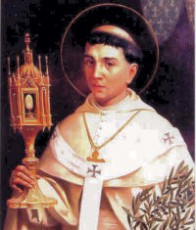Catholic Blesseds, Saints, Solemnities & Holy Days

Saint Norbert
Feast Day: June 6
Patronage: Invoked during childbirth, Safe Delivery, Magdeburg
St. Norbert, also known as St. Norbert of Xanten, was born in 1080 and was a Bishop of the Catholic Church. He was also the founder of the Premonstratensian Order of the Canons Regular. He was born in Xanten, on the left bank of the Rhine near Wesel, Cologne. This is where he grew up and was educated there as well. His father was related to the Imperial house of Germany.
St. Norbert was ordained a subdeacon, and was appointed to a canonry at Xanten where he lived a life of pleasure. Soon, he was summoned to the court of Frederick of Cologne and later to Henry V, Holy Roman Emperor, where he became the Emperor’s Almoner, the position that is in charge of distributing the King’s charity. He avoided ordination to the priesthood, and even declined an appointment as Bishop of Cambria. Soon he had a conversion after a near fatal horse riding accident, and denounced his appointment to the King. He returned to Xanten to lead a life of penance, and placed himself under the direction of a Spiritual Advisor. He founded the Abbey of Furstenberg, and endowed it with a portion of his property. Soon afterward, he was ordained to the Priesthood.
He then attempted to reform the other canons of Xanten, but his asceticism did not sit well with them and they denounced him at the local Church Council of Fritzlar. He then resigned his position and sold his all of his property and gave the proceeds to the poor. He visited Pope Gelasius II, and gained permission to become and itinerant preacher and he preached throughout northern France, performing many miracles.
During the Council of Reims in October of 1119, Pope Calixtus II requested Norbert to found a Religious Order at the Diocese of Laon in France. He founded an order about 10 miles from Laon called Premontre. It wasn’t long and he had a following of his first thirteen disciples. By the second year the community had grown to over forty. They all took their vows and the Order of the Canons Regular of Premontre was founded. He soon had his community living in camp surrounding the chapel of St. John the Baptist. He had discovered through a dream the spot where the relics of St. Ursula and her companions and other martyrs lay hidden. In 1125 Pope Honorius II approved the constitution for the Order.
Pope Honorius II appointed Norbert to the Archbishopric of Magdeburg in 1126. Several assassination attempts were made as he began to reform the lax discipline in his See. He was especially vigilant in protecting the Church’s rights against the secular power. In the schism following the election of Pope Innocent II in 1130, Norbert supported Innocent and resisted the ways of the Antipope Anacletus II. In his last years, he was chancellor and adviser to Lothair II, the Holy Roman Emperor. He persuaded him to lead an army in 1133 to Rome to restore Pope Innocent to the Papacy. He died in Magdeburg on June 6, 1134. His body was buried in the Norbertine Abbey. Martin Luther preached in the city of Magdeburg and as a result, the city became Protestant. On May 2, 1627, his body was finally brought to Prague where it remains to this day, displayed as an icon in a glass fronted tomb. Pope Gregory XIII in 1582 canonized him and his statue appears above the Piazza Colonnade of St. Peter’s Basilica in Rome.





